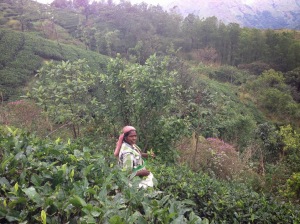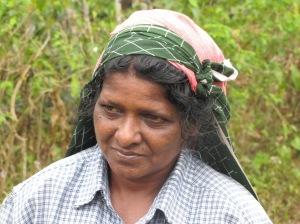This is the second of two posts on India by Rink Dickinson, Co-founder and Co-president, Equal Exchange
Read Part I here.
OUR VISIT TO KERALA

Here in South India, we can report there have been positive changes in the last few years in the effort by Peeramade Development Society (PDS) and Tea Promoters of India (TPI) to empower small tea farmers. Peeramade Development Society is a Catholic church of India based NGO that has a variety of projects to support the rural poor. Tea Promoters of India is a unique family-owned tea operation that has a foundational commitment to authentic fair trade and to small tea producers.
In 2004, PDS received a major investment to build a tea factory, to buy and process leaf from small farmers, and to export to ATO’s and sympathetic buyers in the global north. The factory was designed to process low quality CTC (cut,tear.curl) tea in high quantities, which in hindsight was clearly an ill-conceived strategy. The project was not implemented in a lean manner. The end result was an expensive, massive facility set up with the operational driver of processing large quantities of low quality CTC processed tea. The factory also did a poor job marketing to ATOs and sympathetic buyers in Europe and the U.S.

The result was a failure on many levels. The volumes of tea were never really there to get the factory near break-even. The northern buyers did not find the PDS operation easy to work with. The financial losses mounted.
On the farmer level, some 2000 small farmers were given the signal to sell their leaf to the factory. But as the sales weren’t coming from northern buyers, and as finances became worse, the factory bought less and less leaf from the farmers. Unable to sell their leaf, farmers stopped tending to their tea bushes; reducing production and quality and starting a cycle of divestment.
By early 2010, the factory and operation were near critical failure. But this small farmer tea supply chain did not fold. Through negotiations and moral suasion, PDS was able to bring TPI in as a full partner to manage the factory and rebuild the supply chain. (Note: to better understand the many steps of tea production and processing (some of which are shown in the following photos, click here.)




 ]
]

TPI, based in northern India, is a long time partner for Equal Exchange in the work of building a small farmer tea supply chain. TPI changed the strategy, the factory, the quality systems and, ultimately, the culture of the PDS project: now reborn as the Small Farmers Tea Project.
A key change was to bring in Mr. M C Dominic, a TPI staff person who is a native of Kerala. Dominic has generally worked half time in the north and half time in the south and because he speaks Hindi (north India) and Malayalam (Kerala), and because of his skills and experience, he has been able to transfer the TPI system to South India.
On the operational level, the factory has been completely re-done. The CTC lower quality tea strategy was thrown out and replaced by new “orthodox” higher quality, larger leaf strategy. Orthodox machines, rare in the Kerala tea industry, were brought in and installed. Because Orthodox machines and processing are new, this was an operational change, a cultural change, and a strategy change all rolled into one.

Underneath this is TPI’s deep knowledge of the market, both in-country and in the global North. TPI understood that the small farmers could not compete in CTC and that the machinery and the culture of Keralian tea had to be challenged if there was going to be any space for a social based tea in what is a very competitive market. The fact that “fair trade” in tea usually means large plantations with low costs, or controlled labor projects without democratic content, selling at pathetically low prices (such as in Kenya) made the challenge facing the PDS small farmers even greater.

So the strategy of TPI and PDS in this new period has been to move to more investment, higher costs, and more processing steps, in search of a higher quality and a higher market price. It is a gamble: not making these changes, however, would have meant no chance for success.
As a result, this massive factory that was working at a fraction of its CTC capacity has been partially brought down to size by moving to a lower scale more customized orthodox processing. But still the factory had to bring in much more leaf to get it running in a reasonable fashion even as a lower volume orthodox factory.
During much of the same time period that Equal Exchange has been telling store accounts about real small farmer fair trade tea, and serving tea, and promoting tea, Dominic and his team have been knocking on doors and going back to small farmers looking for leaf and preaching the new quality path. The leaf a farmer plucks on their family plot at PDS is not the same leaf as what a small farmer plucks in Darjeeling at Mineral Springs or Potong. The Darjeeling culture is to only pluck the top two leaves and a bud from the new shoots of the bush. This is part of the basis for the high quality and strong characteristics of the Darjeeling cup. In PDS, and Kerala in general, the culture is to pick much more including the bigger leaves and rougher leaves which add weight but greatly reduce quality. This in turn leads to spending a great deal of factory time taking out the leaves that really should never have been plucked in the first place.

The new TPI formula is to pay well above market price but to teach the farmers to pick less and to pick better. The need to find more leaf has led TPI and PDS to work with organizations that are compatible with the Small Farmers Tea Project but are not small farmers. One example of this is the Kurisumala Ashram which is a meaningful leaf provider and part of the overall project. The Ashram is a community of Christian spiritual seekers who live a simple agrarian life in near silence. The Ashram runs a 150-head dairy operation, manufactures milk, bakes bread for consumption, grows food for consumption, and now grows tea for the project.

But the backbone of the project is small farmers who grow tea in diverse small plots along with many other crops including pepper, papaya, cardamom, vegetables, and often animals, such as cows or goats.

Jolly Sukumaran, one of the Adivasi tea farmers





TPI is actively reaching out to these approximately 185 farmers asking them to supply tea leaf and educating them about the need for less rough leaf and the importance of picking just the young, fresh leaves. The factory has increased prices for higher quality leaf above the already above market price they pay to push these farmers towards quality. Another related change to make the new tea system work is to incentivize these farmers to pick their bushes more often. The more the bush is picked, the more dense, productive and tender it will be, which further supports the higher quality direction.

Gautam Mohan and Paul Mathew of TPI
REAL PROGRESS ON THE GROUND
All of these modifications are slowly making positive change. The crop is being more actively managed. Quality has begun to improve. More farmers are getting to sell their leaf to the project. The project cannot remove the debts of the past but is now operating successfully and sustainably. A corner has been turned and the South Indian small farmer tea gains of the last ten years have been saved.
THE SMALL FARMER ALTERNATIVE
It has been a tremendous commitment to put the Small Farmers Tea Project back on the path of sustainability. It has taken great commitment for Equal Exchange in the US and the UK and our allies to build a small farmer option in the marketplace.
It is increasingly clear that consumers will get a choice.
There will be socially responsible tea programs such as Rainforest Alliance or similar programs such as mainstream little-impact fair trade. These programs will be on almost all tea products supported by large plantations and large retailers. But there will also be an authentic fair trade tea supply chain. These tea products support small farmers, democracy, fair trade organizations, and stores who want real options for their customers.
We still have a long way to go to reform the tea trade. The task is quite challenging. But it can be done. The pieces are now in place.
In hope,
Rink

Read Full Post »
 It was 2010, and while I travel to coffee regions frequently, this was my first visit to Uganda. We’d created this open space to get to know each other better. I wanted to learn about the daily lives of these women, many of whom struggle to cultivate coffee to sell to buyers like Equal Exchange, and grow their beloved matoke (banana) for consumption in the home, on a small piece of land. They also wanted to hear about my life in the United States, and about my son, Magnus. For me, this was the beginning of a journey that would teach me about the lives of some of these women in intimate detail: their trials and tribulations, joys and celebrations.
It was 2010, and while I travel to coffee regions frequently, this was my first visit to Uganda. We’d created this open space to get to know each other better. I wanted to learn about the daily lives of these women, many of whom struggle to cultivate coffee to sell to buyers like Equal Exchange, and grow their beloved matoke (banana) for consumption in the home, on a small piece of land. They also wanted to hear about my life in the United States, and about my son, Magnus. For me, this was the beginning of a journey that would teach me about the lives of some of these women in intimate detail: their trials and tribulations, joys and celebrations.

































